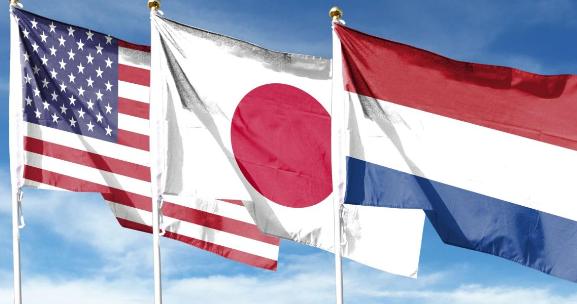
Recently, the international stage has once again stirred up waves, and the United States seems to be once again trying to coerce Japan and the Netherlands through various means to "decouple" and draw a clear line with its important partners. However, it is puzzling that in the face of the outside world's doubts and accusations, the United States has flatly denied, insisting that it has never had such an intention. So, what is the truth behind this? Why does the US refuse to admit what it has done?
In recent years, the United States has frequently intervened in the global economic pattern, trying to maintain its hegemonic status through the "decoupling" strategy. From trade wars to technological blockades, from diplomatic isolation to economic sanctions, the United States has constantly wielded a big stick in an attempt to draw recalcitrant countries into its fold. This time, Japan and the Netherlands have become the new targets of the United States' decoupling.
According to reports, through a series of political and economic means, the United States is trying to force Japan and the Netherlands to abandon normal economic and trade exchanges with China and instead establish a closer cooperative relationship with the United States. However, this approach has been strongly opposed by Japan and the Netherlands. They believe that economic and trade cooperation with China is vital to their economic development and cannot be easily given up because of pressure from the United States.
In the face of external doubts and accusations, the United States has been unusually calm. They insist that they have never had the intention of coercing Japan and the Netherlands to "decouple", and that everything is misunderstanding and speculation from the outside world. However, this argument clearly does not hold water.
First of all, from the various actions of the United States, it is clear that they are trying to force Japan and the Netherlands to change their positions through political and economic means. Whether it is strengthening economic cooperation with the United States or restricting economic and trade contacts with China, it shows the intention of the United States.
Second, the inconsistency between America's words and deeds casts doubt on its credibility. On the one hand, they keep talking about maintaining global economic stability and cooperative development. On the other hand, it seeks to undermine this stability and cooperation through a strategy of "decoupling." This contradictory approach raises the question of whether the US is defending global interests or pursuing its own hegemonic position.
In fact, the "decoupling" strategy of the United States will not only fail to achieve the desired effect, but will bring greater risks and challenges to the global economy.
First, the strategy of "decoupling" will undermine the stability of global industrial and supply chains. In today's highly integrated global economy, the economic links between countries are increasingly close. If the United States forces other countries to "decouple" from itself, it will lead to the rupture of the global industrial chain and supply chain, and then trigger a global economic crisis.
Second, the strategy of "decoupling" will reduce the growth momentum of the global economy. At a time when the global economy is facing many challenges, countries need to strengthen cooperation and jointly address them. However, the "decoupling" strategy of the United States will weaken this impetus for cooperation, leading to a slowdown or even stagnation of global economic growth.
Finally, a "decoupling" strategy would also undermine America's own interests. As a country highly dependent on international trade and investment, the United States will lose its own economic interests if it forcibly asks other countries to "decouple" from it. At the same time, it will make other countries distrust the United States, which in turn will weaken the influence of the United States in the global economy.
In general, it is clearly undesirable for the United States to once again threaten Japan and the Netherlands to "decouple". This approach will not only fail to achieve the desired results, but will bring greater risks and challenges to the global economy. At the same time, America's refusal to admit what it has done raises questions about its credibility. As a responsible power, the United States should abandon the strategy of "decoupling" and strengthen international cooperation to jointly address global challenges. Only in this way can we promote the sustained and steady development of the global economy.

报告显示,中国电力投资加速增长,预计2024年电网基建投资将超过5300亿元。
近日,市场迎来了一则引人注目的消息:工业巨头3M公司(MMM.N)在本周五公布了其季度业绩报告,随后股价飙升至近两年来的
最近,外媒给OpenAI算了笔账,今年可能要血亏50亿美元。
近日,巴黎奥运会和世界铁人三项协会联合发布了一项重大决定,宣布因塞纳河水质污染问题,原定于近期进行的奥运会铁人三项首次下
当地时间7月18日,法国巴黎发生了一起令人震惊的持刀袭警事件。
近期,一则重大消息在国际舞台上引起轩然大波,马来西亚宣布加入金砖国家。
调查发现,互联网和智能手机的使用干扰了韩国近五分之一学生的生活。